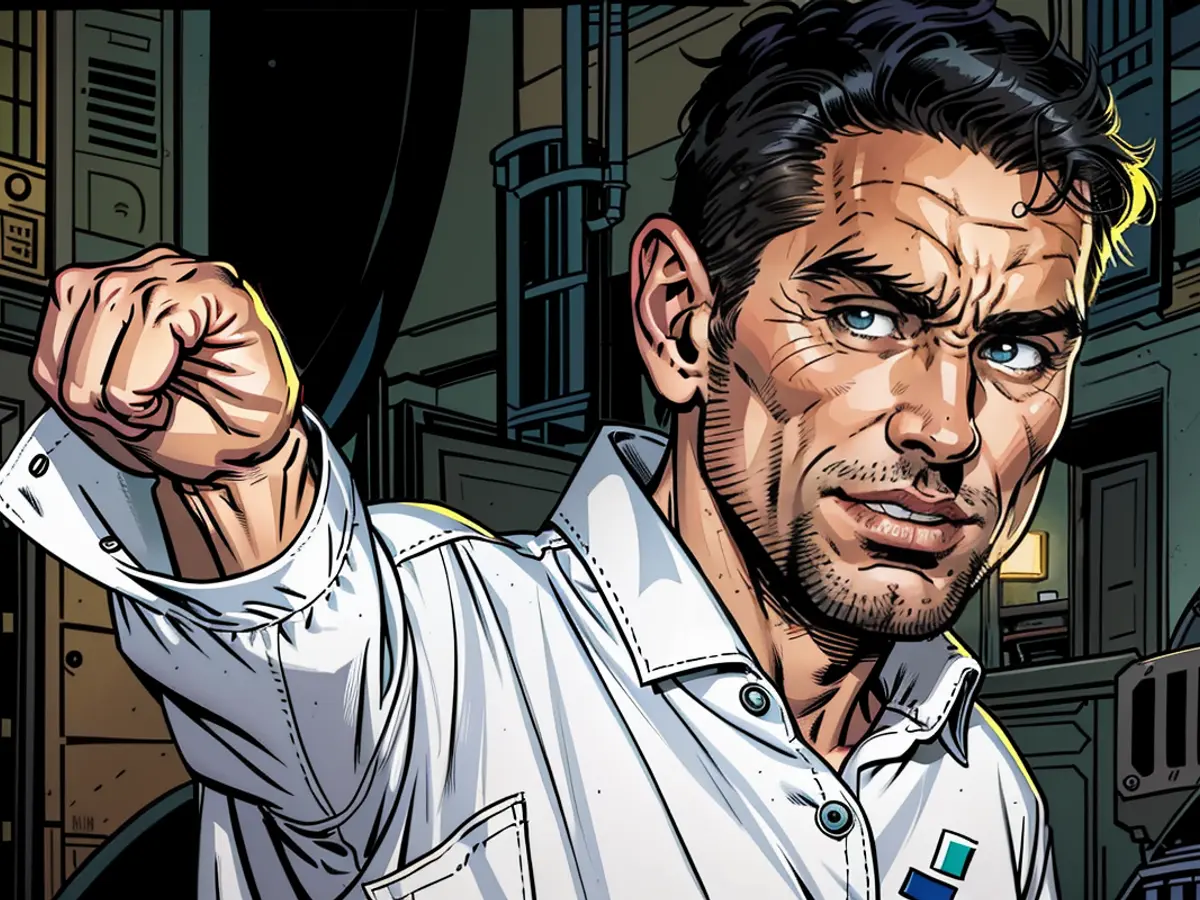Despite a four-percent shift in the state parliament, left-leaning politicians continue to hold authority.
At the Saxony election, the Left party manages to remain in the state parliament despite facing substantial losses. They fail to surpass the 5% threshold with second votes and are predicted to secure 4.3% by ZDF. Notably, two Left direct candidates in Leipzig constituencies are comfortably leading their rivals. Two direct seats would guarantee the Left a few seats in the new state parliament. Besides, these potential winners may secure the first positions on their party's state list, granting them a seat through the so-called basic mandate clause, a Saxony regulation.
8:28 PM: The AfD projection for Thuringia indicates continued growthIn ZDF's current election result projection for Thuringia, the AfD keeps improving its result, hitting 33.4% of the votes. The CDU stands at 23.8%, the SWB at 15.5%, the Left at 11.9%, the SPD at 6.0%, and the Greens at 3.4%. FDP fails to exceed 1.2%.
8:17 PM: In Saxony, the CDU's lead over the AfD is an absolute nail-biterAs per the current ZDF projection, the CDU in Saxony has a mere 0.1 percentage point advantage over the AfD. The Christian Democrats occupy 31.5%, and the AfD – classified as right-wing extremist by domestic intelligence agencies – is at 31.4%. The AfD has significantly outpaced the CDU in Thuringia, according to projections. The Greens are currently at 5.1% in Saxony and are at risk of losing their parliamentary seats. The Left barely hits 4.3% in the projections, making its chances of winning slim. The SPD securely holds its position in the state parliament with 7.6%.
7:56 PM: Höcke's direct entry into the Thuringia state parliament faces potential jeopardyAFD faction leader Björn Höcke's chances of entering the Thuringia state parliament directly are at risk. With 68 of 74 constituencies counted, the CDU candidate, Christian Tischner, leads with 42.3% of the votes, trumping Höcke's 40.4%. If Tischner secures the majority of votes in the Greiz II constituency, Höcke may miss out on a direct mandate and be confined to a parliamentary seat aboard the state list, especially if many AFD direct candidates succeed.
7:50 PM: Höcke on the AFD's victory: "The firewall policy has failed"AFD emerges as the dominant force in Thuringia, according to the election results. Höcke, the AFD's top candidate, views the outcome as a "historic failure" of the "firewall policy" and discusses the upcoming government formation.
7:42 PM: Ramelow on the Left's "cannibalization": "The CDU equated the AfD and the Left"Thuringia's Minister President Bodo Ramelow believes the Left party has been "cannibalized" by two key factors: Firstly, the CDU consistently equated the AfD and the Left, employing "exclusion rhetoric" towards them, even though they had shared power for five years. Secondly, the BSW promised to bring the AfD 17% of votes, but the party actually ended up gaining it. Ramelow can still celebrate high voter turnout.
19:26: Nouripour on the AFD's success: "My thoughts are with those who are afraid"The AFD wins over 30 percent in both Saxony and Thuringia's state elections, leaving the traffic light parties far behind. Nouripour views the AFD's election result as a "turning point" and a call to defend democracy together.
19:13: Saxony's latest projection: The CDU's victory comes within reachThe most recent ZDF projection shows a tight race between the AFD and the CDU: The Christian Democrats lead with 31.7%, barely ahead of the AFD's 31.4% vote tally. The BSW gets 11.4%, the SPD 7.8%, the Greens 5.5%, and the Left misses the 5% threshold with 4.3%.

19:08: Wagenknecht mulls a CDU-BSW-SPD coalition in ThuringiaBSW leader Sahra Wagenknecht aims to form a coalition with the CDU and potentially the SPD in Thuringia. "We hope to establish a strong government with the CDU – probably also with the SPD," She says in an ARD interview, emphasizing the need to address "massive teaching shortages" in Thuringia and represent the state at the federal level, advocating for peace, diplomacy, and opposition to the deployment of US missiles in Germany. Wagenknecht rejects coalitions with the AfD in Thuringia.
19:02 Latest forecast for Thuringia: AfD enhances its outcome A ZDF forecast for the electoral result in Thuringia suggests that the AfD is performing even better than initially anticipated. The right-wing extremists are reportedly securing 33.1% of the votes in the region. The CDU is at 24.3%, Sahra Wagenknecht's alliance garners 15%, while the Left, currently in power with Bodo Ramelow as the popular Minister President, experiences a near 8% loss and settles at 11.7%. The SPD gathers 6.6%, and the Greens gain 4% of the votes.
18:56 Göring-Eckardt: AfD's success signifies a democratic "turning point" in Germany Green Party politicians appear more unsettled by the AfD's victory in Thuringia than by their own party's setback. Katrin Göring-Eckardt, the green Bundestag vice-president, describes the triumph of the right-wing extremists as a "turning point" in Germany. Party leader Omid Nouripour admits that his party's failure is merely "marginal" when considering that the AfD has overtaken as the dominant force in a state parliament.
18:48 Kretschmer on Saxony: "We have every reason to celebrate" The incumbent Saxon Minister President Michael Kretschmer views the CDU as a cornerstone of the government coalition. "We have every reason to celebrate," Kretschmer declared at his party's celebration event. "Following five years of hardship, people in Saxony have put their trust in the CDU and refused to express their dissatisfaction through a protest vote."
18:39 Preliminary Count for Saxony: CDU's lead over AfD shrinks Initial projections on ZDF indicate that the CDU's advantage over the AfD in the Saxony state election has diminished: The CDU currently holds a slim lead of 31.9%, while the AfD records 31.3%. The BSW stands at 11.6%, the SPD at 7.8%. The Greens would barely make it into the state parliament with 5.2%, while the Left falls short with 4.5%.
18:33 AfD Chair Weidel Seeks Government Participation for AfD AfD federal party chair Alice Weidel is advocating for government participation for her party in Thuringia and Saxony. "Under conventional circumstances, adhering to practices in this nation, the strongest party, which is the AfD, should be exploring collaboration possibilities," she stated on ARD, referring to Thuringia. "Voters in both federal states desire the AfD to be involved in government. We represent 30% of voters in both states, and a stable government is not possible without us."
18:30 SPD Secretary-General: "There Was a Real Risk of Being Ousted from the State Parliament" SPD secretary-general Kevin Kühnert has accepted his party's moderate results in the Thuringia and Saxony elections. "This is not an occasion for celebration for the SPD," he conceded on ARD. Simultaneously, he acknowledged that his party has been grappling with difficulties for years. "Facing elimination from the state parliaments was a genuine threat," Kühnert remarked. "Engaging in battle is valuable, we are needed." A significant transformation is necessary, he maintained, mentioning the need for more articulation and listening to voters. Regarding Chancellor Olaf Scholz, he stated, "We need to articulate our politics collectively."

18:23 Höcke Celebrates Thuringia Result as "Historic Triumph" AfD parliamentary group leader Björn Höcke views the Thuringia result as "historic." The AfD now tops the popularity polls in the federal state, "the nonsensical firewall must come to an end," he declared on MDR. The only change will occur with the AfD, he added.
18:21 Chrupalla on Thuringia: "We are Tied with the CDU" AfD party leader Tino Chrupalla lauds his party's result as remarkable, reflecting a shift in voter sentiment in both federal states. The AfD is open to negotiations with all parties, he said on ZDF. In Saxony, the AfD is "equal to the CDU," and it is committed to governing for the betterment of Saxony, he added.
18:17 CDU Secretary-General: No Collaboration with AfD CDU secretary-general Carsten Linnemann has dismissed any plans for collaborations with the AfD in Thuringia or Saxony. "We are unequivocally clear on this," he asserted on ARD. The CDU will now establish governments from the center of the parliament, he asserted. He is optimistic about the success of this approach. He emphasized that the CDU remains the last surviving people's party and the "bulwark," he affirmed, adding that the traffic light parties have suffered a setback.
18:13 Saxony Vote Predictions: CDU edges out AfD, BSW at 12%, Greens cling onThe initial indication for the Saxony state election has the CDU as the leader with 31.5% of the votes, barely surpassing the AfD's 30%. The BSW securces the third strongest position with 12%, while the SPD hangs on in the parliament with 8.5%. The Greens are just managing to maintain a presence with 5.5%. The Left and the FDP are predicted to be absent from the new parliament, but the Greens could still remain.
18:10 Thuringia Forecast: AfD leads CDU, BSW scores 16%The opening forecast for the Thuringia state election suggests the AfD might hold a substantial majority of 30.5%, followed by the CDU with 24.5% and the Left with 12.5% of the votes. The SPD continues in the parliament with 7%, while the BSW earns a seat with 16%. The Greens and the FDP remain under the 5% threshold.
18:01 AfD tops Thuringia, BSW makes double digits in SaxonyBased on the first prediction post-Thuringia state election, the AfD takes the lead. The SPD exceeds the 5% threshold, while the Greens and FDP fall below it. In Saxony, the BSW achieves a ten-digit outcome for the first time. The CDU slightly outranks the AfD, but both the Left and the FDP would fail to enter the state parliament, according to the projection, but the Greens might still remain.
17:18 Höcke in Danger of Missing State ParliamentAfD faction leader in Thuringia, Björn Höcke, may not secure a seat in the forthcoming state parliament. His successful party colleagues might even jeopardize his chances. Several AfD candidates have good prospects for direct victories in their constituencies. However, Höcke is up against tough competition in his constituency of Greiz II from the CDU candidate Christian Tischner. If Tischner wins, and the AfD has more direct victories than allowed from the second vote outcome, none could enter via the state list, not even Höcke, who ranks first in his constituency. In this scenario, the AfD might ask a successful direct winner to forego their state parliament seat, enabling Höcke to secure his mandate.

16:48 Thuringia AfD Plans Media-free CelebrationThe Thuringia AfD's election party is not expected to be covered by the media. The party, designated as right-wing extremist by the constitutional protection agency, attempted to exclude various media outlets from the event. However, a court forbade this, prompting the state branch to expel the press altogether. A party spokesperson attributed the move to organizational problems: there was not enough space at the event location for all the media representatives who had applied for accreditation.
16:29 Approximately a Quarter Voted by Post in SaxonyFor the "decisive election" in Saxony, as stated by Saxony's CDU Minister President Michael Kretschmer, nearly a quarter of eligible voters have already cast their ballots by post. The state electoral officer estimates 24.6% of voters will have cast their votes by post. Voter turnout today is only marginally higher than in 2019, but the electoral officer anticipates many more absentee voters than in 2019.
15:52 Höcke Votes in Lada in Thuringia - Ramelow with Wife in Erfurt
Thuringia's AfD state chairman and top candidate cast his vote around noon at his Bornhagen polling station in the Eichsfeld district. Höcke voted in a Russian-made Lada Niva off-road vehicle.
Minister President Bodo Ramelow voted in the state capital of Erfurt with his wife Germana Alberti vom Hofe. Ramelow has been in power in the Free State for the majority of the last seven years, leading a minority government most recently.
15:40 Thuringia Turnout Surpasses Previous ElectionBy 2 PM, 44.4% of voters had cast their ballots in Thuringia. That is more than two points higher than five years ago. A high turnout is predicted to continue. Absentee ballots are not included in these numbers, according to the state election commissioner. In Saxony, turnout is also higher than in 2019, although only slightly, at 35.4%. However, the election commissioner expects many more absentee votes than in 2019. Polls will close in both states at 6 PM.
15:13 Kretschmer Hopes Coalition Parties Make it to State Parliament14:40 Election Topics for Saxony and ThuringiaApproximately one-third of voters in Saxony and Thuringia intend to vote for the AfD in the September 1st elections. A survey reveals the reasons behind this, highlighting major concerns and issues. Immigration is only one of the issues.

14:13 Höcke Leaves Polling Station QuicklyAfD's top candidate in Thuringia, Björn Höcke, cast his vote around midday at the Bornhagen polling station but left soon after and didn't speak to journalists nearby. Having consistently lost to the CDU candidate in his Eichsfeld district, Höcke switched to the Greiz constituency. However, he also faces an imminent defeat against the CDU there.
13:50 Voter Turnout in Thuringia Reminiscent of 2019 Midday Figure
In Thuringia, the midday voter turnout appears to mirror that of the previous parliamentary election, as per the state election commissioner's report. Approximately 32% of eligible voters had cast their ballots at polling stations by noon. The absence of absentee voters is not included in these figures. In 2019, the turnout was 31.2% at this same time. There seems to be more interest in the state election compared to recent European and local elections, where the turnout was 24.3% at the same hour.
13:29 Anticipated High Voter Turnout in Saxony
Saxony is predicted to have a high voter turnout for the state election. By noon, 25.8% of eligible voters had cast their ballots, as reported by the Statistical State Office in Kamenz. In 2019, the figure was 26.2% at this time. Absentee voters have not yet been accounted for in the preliminary numbers. It is estimated that 24.6% of eligible voters will vote by mail, which is a significant increase compared to the 16.9% in 2019. So far, the elections have run smoothly, with no major issues reported, as confirmed by the state election commission.
13:11 Election Result Could Threaten Berlin Coalition
The election results in Saxony and Thuringia are still pending. Economist Albrecht von Lucke suggests that if the SPD fails to secure a seat in the state parliament, this would be akin to an earthquake. In an interview with ntv, von Lucke evaluates the election and its potential implications.

12:44 Police Investigating Election Threat at Polling Station
Following an incident at a polling station in Gera, police are conducting an investigation into a threat. A man wearing an AfD T-shirt attempted to vote at the polling station in the morning, and the polling station manager requested him to remove the shirt as party advertising was prohibited within the polling station. Although he complied, he threatened to return as he was dissatisfied with how he was treated upon leaving the polling station grounds. Police then filed a report and issued a warning to the man. Furthermore, police in Erfurt are investigating some political graffiti, such as "Höcke is a Nazi," near polling stations for vandalism.
12:15 Correctiv Warns Against Misinformation Regarding Ballot Paper Signing
The research network Correctiv has issued a warning about a common misconception. It claims that signing the ballot paper helps prevent electoral fraud. However, the Federal Returning Officer's office clarified to Correctiv that: "The ballot paper must not be signed. Signing the ballot paper by the voter could compromise the ballot paper's secrecy, rendering it invalid entirely."
11:51 Voigt Looks Forward to "Sustainable Majority Relations"
Thuringia's CDU top candidate Mario Voigt has voted, hoping that "many Thuringians will exercise their right to vote and shape the future of our country." He also expressed his hopes for "sustainable majority relations" to allow the state to progress once more.
11:25 Sonneberg Witnesses a Surge in Far-Right Attacks

Sonneberg, the first district in Germany to be headed by an AfD politician, has seen a significant increase in far-right attacks since its administration change. Activists have reported being massively threatened, with many resigning from their jobs. The number of far-right attacks in the district has nearly quadrupled over the past year. Experts have identified a connection between these attacks and the AfD district administrator.
10:57 Kretschmer Views the State Election as Critical to Saxony's Future
Saxony's Prime Minister Michael Kretschmer regards the state election as potentially the most significant in 34 years. He cast his vote in Dresden and expressed gratitude to those who voted differently from him in the past but have now chosen the "strong force in the bourgeois center," representing the Saxon Union. According to recent polls, Kretschmer's CDU and the AfD have been neck and neck.
10:30 Ramelow Emphasizes Importance of Democracy Despite election Uncertainty
For Thuringia's Prime Minister Bodo Ramelow, election day is a "celebration of democracy" - even if his reelection may be uncertain. In an interview with ntv, the Left Party politician explains why he advises against forming a minority government and doubts the ability of the BSW.
09:59 Historian Criticizes Election Date on Historical Anniversary
Historian Peter Oliver Loew has spoken out against the election date for the state elections in Saxony and Thuringia, marking the 85th anniversary of the German invasion of Poland in 1939. According to the director of the German Polish Institute, there were undesirable historical associations attached to holding elections on September 1st. Referring to the AfD, which has been classified as "securely right-wing extremist" by domestic intelligence services in both states, Loew noted: "Such an election outcome in Dresden and Erfurt could cause distressing reminders of the past."

09:30 "Pivotal Vote": Full Details on Saxony State VoteApproximately 3.3 million eligible voters in Saxony have the power to decide today who will shape the political landscape of the Dresden state legislature in the upcoming years. The CDU may lose its position as the dominant force in the state for the first time since 1990, according to Saxony's Minister President Michael Kretschmer, who considers this an "absolutely crucial vote."
09:05 Kretschmer Calls Out Traffic Light Government for "Pre-Election Chaos"It's election day in Saxony, and the question arises: Will Minister President Michael Kretschmer continue the CDU's streak of victories in the state? In an interview with ntv, Kretschmer shares his views on the refugee controversy, the traffic light government, and the Ukraine conflict.
08:46 Election Info for ThuringiaToday is decision day in the heart of Germany: The future leader of the federal state with its nearly 2.1 million residents will be chosen for the next five years. Will the AfD, led by Björn Höcke, become the strongest force in Thuringia?
08:24 Potential Impact of the AfD on DemocracyAccording to polls, the AfD is likely to increase its power in the upcoming elections in Saxony and Thuringia. This development could pose a threat to democratic institutions, as a research group has pointed out, because the rule of law may not be as robust as many believe.
08:00 Polling Stations in Thuringia and Saxony OpenToday, new legislative bodies are being elected in Thuringia and Saxony. In the polls, the AfD is leading in Thuringia. In Saxony, the CDU, led by incumbent Michael Kretschmer, and the AfD are neck and neck. The first projections are expected as polling stations close at 6 pm. The elections in the two eastern federal states also serve as a barometer for the traffic light coalition in Berlin.
For the current red-red-green coalition, led by Minister President Bodo Ramelow (Left) in Thuringia, there is no majority in the polls. A coalition with the CDU, the alliance of Sahra Wagenknecht (BSW) and the SPD is a possibility after the election. In Saxony, it remains unclear if the current coalition of CDU, SPD, and Greens will still hold a majority. Kretschmer does not rule out an alliance with the BSW. The Left faces the risk of being ousted from the Saxony parliament. The Greens and FDP could face the same fate in Thuringia.
In the context of the given text, the SPD might struggle to maintain its influence in future elections if the trend of facing substantial losses continues. Despite this, The SPD remains a significant player in German politics and has a strong history and following.
In light of the most recent election projections, The SPD is projected to secure a small percentage of votes, which is a consequence of the shifting political landscape and increased voter support for other parties like the AfD. The SPD, however, should utilize this opportunity to rebuild its base and develop compelling policies that resonate with voters.









